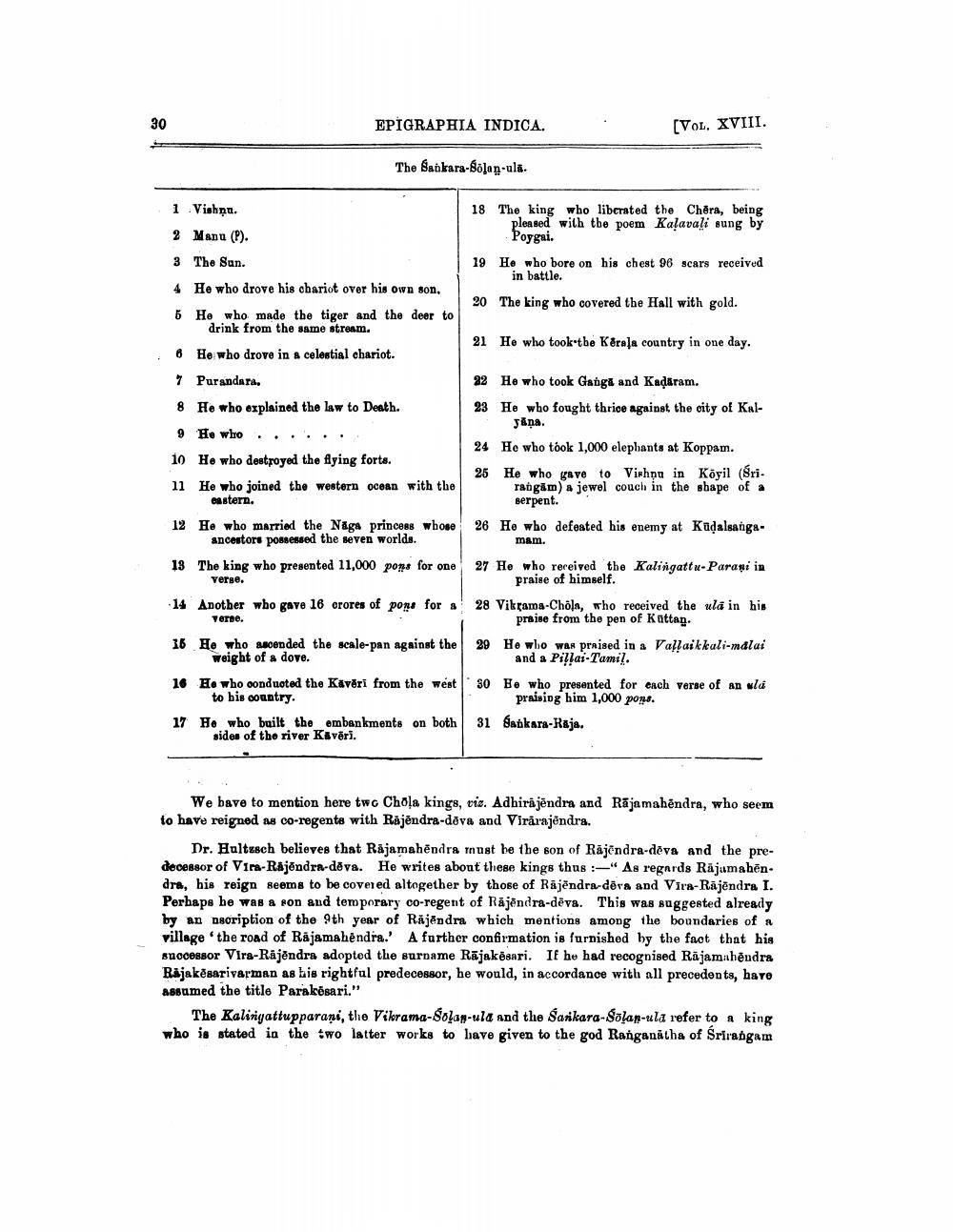________________
EPIGRAPHIA INDICA.
[Vol. XVIII.
The Sankara-sõlan-ula.
18
The king who liberated the Chēra, being
pleased with the poem Kalavali sung by
Poygai. He who bore on his chest 96 scars received
in battle.
19
20
The king who covered the Hall with gold.
21 He who took the Kéraļa country in one day.
1 Vishnu. 2 Manu (). 3 The Sun. 4 He who drove his chariot over his own son, 6 He who made the tiger and the deer to
drink from the same stream. 6 He who drove in a celestial chariot. 7 Purandara. 8 He who explained the law to Death.
9 He who ...... 10 He who destroyed the flying forts. 11 He who joined the western ocean with the
eastern. 12 He who married the Någa princess whose
ancestors possessed the seven worlds. 13 The king who presented 11,000 pons for one
Verse. 14 Another who gave 16 crores of pons for a
verne. 16 He who ascended the scale-pan against the
weight of a dove. 16 He who conducted the Kavori from the west
to his country. 17 Ho who built the_embankments on both
sides of the river Kavēri.
22 He who took Ganga and Kadaram. 23 He who fought thrice against the city of Kal
sana. 24 He who took 1,000 elephants at Koppam. 25 He who gave to Vishnu in Köyil (Sri.
rangam) a jewel couch in the shape of a
Berpent. 26 He who defeated his enemy at Kadalsanga
mam. 27 He who received the Kalingattu-Parani in
praise of himself. 28 Vikrama-Chöln, who received the ula in his
praise from the pen of Kattan. 29 He who was praised in a Valsaikkali-malai
and a Pillai-Tamil. s0 Be who presented for each verse of an ulu
praising him 1,000 pons. 31 Satkara-Raja.
We bave to mention here two Chola kings, viz. Adhirajëndra and Rāja mahendra, who seem to have reigned as co-regents with Rajendra-dēva and Virarajendra.
Dr. Hultesch believes that Rajamahēndra must be the son of Räjēndra-deva and the predecessor of Vira-Rajendra-deva. He writes about these kings thus :-" As regards Rājumahēn. dra, his reign seems to be covered altogether by those of Rajēndra-dëra and Vira-Rajendra I. Perhaps he was a fon and temporary co-regent of Rajendra-deva. This was suggested already by an neoription of the 9th year of Rajendra which mentions among the boundaries of a village the road of Rajamahendra.' A further confirmation is furnished by the fact that his successor Vira-Rajendra adopted the surname Rājakēsari. If he had recognised Räjamahendra Räjakēnarivarman as his rightful predecessor, he would, in accordance with all precedents, have assumed the title Parakösari."
The Kaliriyattupparans, the Vikrama-Solar-ula and the Sarkara-Solar-ula refer to a king who is stated in the two latter works to have given to the god Ranganatha of Srirangam




